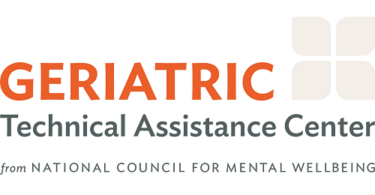
Older Adults and Behavioral Health
The National Council on Aging (NCOA) reported that approximately one in four older adults in the U.S. have a mental illness. This number is expected to double to 15 million by 2030. Additionally, according to the Substance Abuse and Mental Health Services Administration (SAMHSA) and NCOA, one in five older adults may be affected by combined alcohol and medication misuse. These behavioral health issues in older adults may also be accompanied by physical health conditions, such as heart disease, diabetes and cancer.
For more information on the influx of behavioral health issues in the elderly population, take a look at a series of Issue Briefs detailing the state of mental health and substance use within this population released by SAMHSA and the Administration on Aging.
About the Geriatric Technical Assistance Center
Since 2012, the National Council has operated the Geriatric Technical Assistance Center (GTAC), funded by the New York State Office of Mental Health, for New York State-based organizations. From 2012 to 2016, GTAC 1.0 supported programs that were awarded Integrated Physical and Behavioral Health Care for the Elderly grants in which they integrated physical and behavioral health care services for the older adults aged 55 and older. With an aging baby boomer generation, New York State, like the rest of the country, is on the verge of an “elder boom” and expects to see a 50 percent increase in the number of older adults by the year 2030. Consequently, the state is preparing for an increase in the number of older adults with mental illness from 480,000 to 740,000. Older adults’ physical and behavioral health issues manifest uniquely, impacting how they access and use medical services. As such, behavioral health and primary care providers need to adjust their practices accordingly.
From 2017 through 2021, GTAC 2.0 will provide technical assistance to Partnership Innovation for Older Adults grantees, who are forming community partnerships between mental health, substance abuse, and aging service providers. Through individual and group coaching, in-person learning community meetings, webinars, and resource development, GTAC helps organizations create strong partnerships in order to identify at-risk older adults in the community who are not already connected to the service delivery system. After identifying these older adults, partnerships will assess their needs for services and provide and/or access services to address unmet needs. To most successfully achieve these goals, partnerships will utilize technology in innovative ways, such as telecare, telemedicine, telepsychiatry, and mobile technologies, and will develop and utilize substantial mobile outreach and off-site services capacity.
If you are a Geriatric Health Integration Grantee or a Partnership Innovation for Older Adults Grantee, please visit the GTAC resource page for more information.
GTAC 1.0 Outcomes and Results
The three-year integration grant had eight recipients. Data on individuals served were collected at time of initial screening, annual screening and – for individuals with screening scores defined as “positive” or “at-risk” – at three-month follow-up intervals. This information, in non-individually identifiable form, was submitted monthly to GTAC to create data reports. Health improvement was noted by measuring the change between an individual’s baseline at-risk screening scores and his or her most recent follow-up screening scores.
The data collected from participants demonstrated improvement in care for people over the age of 55. The grantees developed efficient and effective workflows that incorporated collection and use of data. Most reported a change in the way they delivered patient care based on the use of data. Many of the patients served in these programs received services that improved their health, referrals to specialty care, wellness and prevention counseling. The outcomes demonstrate that the services were effective.
Results include:
- Additional grants from the Primary Care Behavioral Health Integration for two of the participants.
- Culture change occurred with staff now focusing on whole person care.
- Improved collection, interpretation and use of data to direct patient care.
- Increased knowledge of the interplay between physical and behavioral health challenges.
- Increased understanding of the behavioral health needs of the geriatric population.
- Better understanding of process sustainability, staff and continued growth in expertise.
- Access to other opportunities that will help sustain this project and other related projects.
Resources and Contact Information
Additional Resrouces:
- Behavioral Health and the Older Adult Population
- Clinical Practice
- Operations and Administration
- Health and Wellness
- Addictions
- Archived GTAC Webinars
For Technical Assistance Requests and General Information:
Nicole Cadovius, MBA, CAPS
Project Director, Geriatric Technical Assistance Center
Phone: (202) 684-7457 x 124
Email: NicoleC@TheNationalCouncil.org
